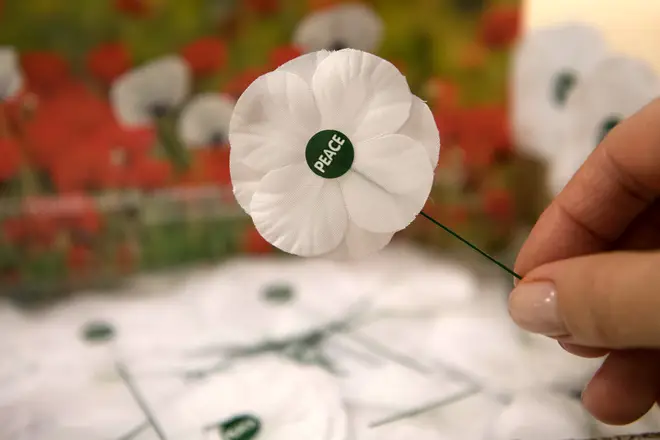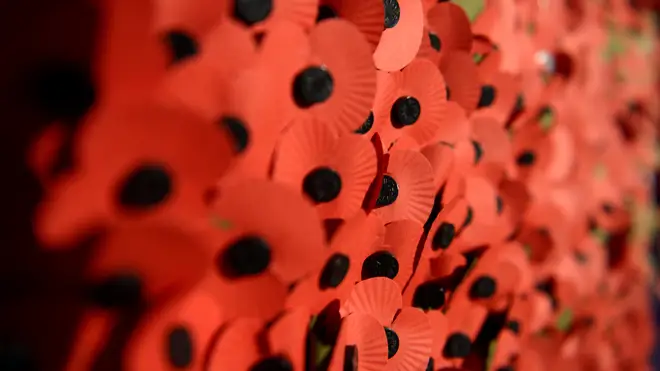
Richard Spurr 1am - 4am
5 November 2018, 15:21 | Updated: 2 April 2020, 15:09
Why do people wear a red poppy for Remembrance Day, and why are white poppies so controversial?
In the lead up to Remembrance Sunday, many of us will wear a red poppy to honour those who fought and died in war.
But an MP has criticised the "disingenuous" trend for wearing a white poppy, which has seen sales soar by 30%.
Johnny Mercer, Tory MP and former British Army Officer, said that "this insinuation that these campaign groups just don't like war so therefore wear the white poppy because the red poppy is a celebration of war. I think it's extremely disingenuous."
The Peace Pledge Union, who makes the white poppy, have said that they were not trying to insult the Remembrance of the British Armed Forces.

The Peace Pledge Union (PPU) is a pacifist campaigning organisation who works on peace-building and nonviolence. It created the white poppy to remember "all those killed in war, all those wounded in body or mind, the millions who have been made sick or homeless by war, and the families and communities torn apart".
The PPU also aims for the white poppy to remember those "killed or imprisoned for refusing to fight and for resisting war."
Chairman Albert Beale told Andrew Castle said that "there are lots and lots of people who are extremely unhappy with the way that the orthodox remembrance ceremonies are operated.
"People who wear white poppies are not showing disrespect for anybody. What they are trying to do, when I wear the white poppy in remembrance season, I'm trying to show that I care for all the victims of war.
"Red poppies are designed by the British Legion to remember the British military dead. The majority of people who get killed in wars are not the military, they're civilians."

The red poppy was a common flower seen on the battlefields during the First World War.
The Royal British Legion, who produces the red poppy, say the colour is based on the natural colour of field poppies and "not to reflect the colour of blood".
"The poppy is a humble, neutral and universal symbol of Remembrance and hope".
The Legion advocates for "a specific type of Remembrance connected to the British Armed forces, those who were killed, those who fought with them and alongside them."
Yes.
Apart from the red and white poppy, there are a variety of other coloured poppies introduced by different campaign groups.
A purple poppy is chosen by some in recognition of animals that were injured or killed in conflict. According to the Animals in War Memorial Fund, eight million horses, who were used to transport ammunition and supplies to the front line, were killed in the First World War.
A black poppy project, which began in 2010, is worn to represent African and Black contributions to war efforts.
Pro-EU campaigners have even knitted blue and yellow 'EU poppies' with the image of the European Union flag. The anti-Brexit campaigners who have created them say they are showing support for a Peoples' Vote ahead of Remembrance Sunday.
A gold poppy was introduced in 2016 to mark 100 years since the Battle of the Somme, and a gold leaf poppy has been introduced this year for the 100 anniversary of the end of the First World War. The gold leaf poppy is the same traditional red poppy but with "1918-2018" written in gold lettering on the leaf.
The Royal British Region says they "have no objection to any other colour of Poppy in principle, and some volunteers wear these side by side."
Still working on my crochet #EUpoppies - this one’s an improvement I think! pic.twitter.com/DF85oENpOh
— Chris Kendall 🇪🇺 (@ottocrat) October 28, 2017
Conservative MP and former British Army officer Johnny Mercer said that he does not like the "insinuation that these campaign groups just don't like war so therefore wear the white poppy because the red poppy is a celebration of war. I think it's extremely disingenuous."
"Every soldier I know wants peace. If you want to celebrate those aims, then you could literally pick any other symbol you liked rather than using a symbol that has been used to raised money for injured soldiers and their families for a long time."
Afua Hirsch condemned his comments, saying that his comments were "frankly offensive".